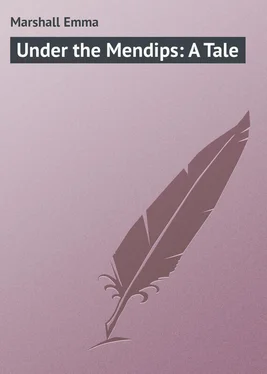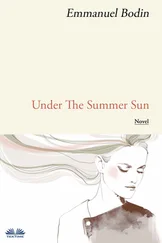Emma Marshall - Under the Mendips - A Tale
Здесь есть возможность читать онлайн «Emma Marshall - Under the Mendips - A Tale» — ознакомительный отрывок электронной книги совершенно бесплатно, а после прочтения отрывка купить полную версию. В некоторых случаях можно слушать аудио, скачать через торрент в формате fb2 и присутствует краткое содержание. Жанр: foreign_prose, на английском языке. Описание произведения, (предисловие) а так же отзывы посетителей доступны на портале библиотеки ЛибКат.
- Название:Under the Mendips: A Tale
- Автор:
- Жанр:
- Год:неизвестен
- ISBN:нет данных
- Рейтинг книги:5 / 5. Голосов: 1
-
Избранное:Добавить в избранное
- Отзывы:
-
Ваша оценка:
- 100
- 1
- 2
- 3
- 4
- 5
Under the Mendips: A Tale: краткое содержание, описание и аннотация
Предлагаем к чтению аннотацию, описание, краткое содержание или предисловие (зависит от того, что написал сам автор книги «Under the Mendips: A Tale»). Если вы не нашли необходимую информацию о книге — напишите в комментариях, мы постараемся отыскать её.
Under the Mendips: A Tale — читать онлайн ознакомительный отрывок
Ниже представлен текст книги, разбитый по страницам. Система сохранения места последней прочитанной страницы, позволяет с удобством читать онлайн бесплатно книгу «Under the Mendips: A Tale», без необходимости каждый раз заново искать на чём Вы остановились. Поставьте закладку, и сможете в любой момент перейти на страницу, на которой закончили чтение.
Интервал:
Закладка:
Joyce had felt ashamed and annoyed as she had never done before; and when a neighbouring squire jogged past on horseback with his son, and looked back with a smile at the highly-decorated figure in the back seat, Joyce felt sure they were laughing at him! Why could not Melville wear a short riding coat like Charlie Paget, and top-boots, and bear himself like a country gentleman, instead of bringing down London fashions into the heart of Somersetshire, and finding fault with everything in his own home; bring his fine friends there without warning, and behave as if he were indeed monarch of all he surveyed.
Joyce's sweet young face was shadowed with the awakening sense of responsibility and the longing to do something, which might smooth the rough places in her father's life, which her brother apparently made without the slightest compunction.
As Joyce stood in the cathedral, not far from the north porch, her head raised towards the belfry-tower, which the great inverted arches support, a ray of sunshine entering at a window in the south transept touched her figure, and illuminated it with a subdued and chastened beauty. Her head was thrown back, and the high coal-scuttle or gipsy bonnet did not hide the sweet face, which, when she had walked demurely down the nave, had been hardly visible.
The little quaint figure was motionless, and the old verger turned twice to look at it, with a strange and curious thrill of admiration. Presently the cloister door opposite opened, and the Dean's swift footsteps were heard approaching, with a regular pit-pat, on the floor of the nave.
He, like the verger, was attracted by Joyce's attitude and the rapt expression on her fair face.
"Why, it's Falconer's little girl!" he thought. "She is generally all smiles and sunshine; now she looks like a nun."
As the Dean passed her, Joyce started. The brightest colour came to her face, and she turned hastily towards the north porch.
The Dean, with old-fashioned and chivalrous courtesy, held the little door, which was cut out of the big one for ordinary use, to let her pass, and then he said:
"Miss Falconer, I think. I hope your good father is well. Is he in Wells to-day?"
"Yes, sir," Joyce replied, bright smiles rippling over her face. "Yes, sir; on magistrates' business."
"Ah, ah! I heard there was some bad case brought in from Mendip. The good lady at Barley Wood will have to learn that much prating about religion ain't what we want. It's like the crackling of thorns under the pot. Let us see you at the Deanery before long; make my compliments to your good father and Mrs. Falconer." And then the Dean ambled away, his thin, black-stockinged legs beneath the decanal coat and apron giving him the appearance of a black stork.
Joyce now hastened towards the Vicar's Close, where her aunt, her father's only sister, lived.
The Vicar's Close at Wells is a sight to delight the heart of the antiquary and the lover of ancient buildings and olden times.
It is entered from the north end of the cathedral by a wide, low gateway, and on either side of a fairly broad footway stands a row of small, picturesque houses with twisted chimneys and low doorways, round which the clematis and honeysuckle climb at their own sweet will. The Vicar's Close, at the further end, is closed in by a small chapel, which entirely blocks the entrance, for any but foot passengers, who obtain egress into the North Liberty by some uneven stone steps at the side of the chapel, leading into the road a few feet above the level of the Close.
If Wells is quiet outside the Vicar's Close, it is quiet indeed within it. Since the summer day when Joyce went into the little garden before a house half-way up on the right side, the hand of the modern Wells builder and plasterer may have marred the complete effect, with stucco and sash-windows; but for the most part the houses in the second decade of the century were guiltless of plate glass and white-wash, and their antique frontage was, even more than now, one of the most picturesque features of the city of Wells.
Joyce had scarcely touched the bright brass handle of the bell when the door opened, and a girl of two or three and twenty sprang out.
"Oh, Joyce, how glad I am to see you! Come in Aunt Letitia, here is Joyce."
Miss Falconer was in the parlour on the right-hand side of the little, low-roofed lobby, and rose somewhat feebly from her chair by the wide grate, which was gay with pots of flowers and evergreens.
"Well, my child, welcome. Have you come to Wells with your father?"
"Yes, auntie; and I am come here for dinner, and after dinner may Charlotte come and do some shopping with me? I have a long list of commissions at the china shop and at Wilmott's."
"Charlotte will be pleased to accompany you, dear child; and when you have taken off your bonnet, come and tell me home news."
There were not many stairs to ascend to Charlotte's bedroom, which looked into the gardens at the back of two other houses of some pretension, between the Vicar's Close and the Deanery.
Charlotte curled herself up in the deep window-seat, and watched her cousin as she laid aside her large bonnet, smoothed her hair, and arranged her white pelerine over her pelisse. Charlotte had a genuine, if rather romantic, admiration for her cousin Joyce. Though a good girl, she was somewhat given to sentiment and languishing, complained of being fatigued, of headaches, and low spirits. She fed upon romance and poetry – the poetry of albums and keepsakes, which was then fashionable. Of course she had a hero who figured in her day-dreams; and she would spend hours at the little window of the sitting-room to catch a sight of him as he passed along the Close. Charlotte would have been much better for some active employment; but Miss Falconer was getting old and feeble in health, and if Charlotte was obedient and gentle, she was well satisfied. So she worked covers in cross-stitch for the chairs, knitted her own stockings, read all the light literature which came in her way, and played on the cabinet piano which stood against the wall in the sitting-room, with its crimson silk front gathered into the centre by a large rosette, and displaying, when open, a very narrow keyboard with very yellow keys.
"How sweetly pretty you look to-day, Joyce. I can't help saying so. Don't be angry. I want to read you some verses I have written, called, 'The Drooping Rosebud.'" And Charlotte took out of her pocket the crumpled page of a copy-book.
"You had better not read it now, Charlotte; Aunt Letitia will expect us to go downstairs."
"Only the first verse," Charlotte said, and then she began:
"'She bent her head in sorrow,
The pretty fragile rose;
She languished for the morrow,
Where light and gladness grows
She languished for a rain drop
To cheer her thirsty heart:
She was so sad and weary;
In joy she had no part.
'As the raindrop to the rosebud,
So is his smile to me;
As – '"
Here Charlotte stopped and blushed. "You know who I mean by the rosebud, and who the raindrop is?"
Joyce laughed merrily.
"Oh, Charlotte, you must not come to me for sympathy. I can't understand such sentiment. You have never spoken to Mr. Bamfylde in your life."
" Not spoken ; no, but there is such a thing as the language of eyes. Joyce, you don't understand."
"No, I don't; and I think, Charlotte, it is nonsense to waste your thoughts on Mr. Bamfylde, who probably has never given you a thought in his life."
"I am not so sure about thoughts , dear. However, I see you don't care about it, or my verses, or me."
"Come, Charlotte, don't be silly! Of course I care about you, but I don't think I am poetical or romantic. Indeed, we ought to go downstairs."
Читать дальшеИнтервал:
Закладка:
Похожие книги на «Under the Mendips: A Tale»
Представляем Вашему вниманию похожие книги на «Under the Mendips: A Tale» списком для выбора. Мы отобрали схожую по названию и смыслу литературу в надежде предоставить читателям больше вариантов отыскать новые, интересные, ещё непрочитанные произведения.
Обсуждение, отзывы о книге «Under the Mendips: A Tale» и просто собственные мнения читателей. Оставьте ваши комментарии, напишите, что Вы думаете о произведении, его смысле или главных героях. Укажите что конкретно понравилось, а что нет, и почему Вы так считаете.












